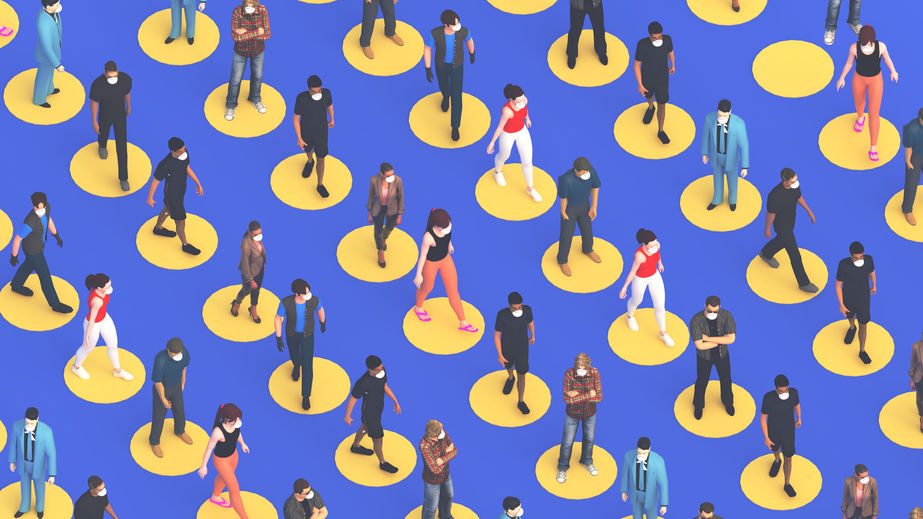How Will Companies Re-Emerge Post COVID-19?
By Dr Thomas SK Tang

Isolation and social distancing... While it may keep the virus at bay, it may have unintended consequences
The current pandemic of COVID-19 is having a devastating effect on the world. At the time of writing, 32 million cases have been reported, with almost a million casualties. The problem is exacerbated through global interconnections which promulgate the infectious nature of the virus. Many countries have attempted to contain the disease through compulsory lockdowns which, although curbing the spread, has caused major economic losses not to mention the social stresses related to confinement.
The World Trade Organization has predicted that the drop in global spending will lead to a decrease of US$6 trillion in merchandise purchases, down by nearly a third from last year. The social impacts are disturbing too. There will be cutbacks equivalent to nearly 400 million full-time jobs due to the virus according to the International Labour Organization in the second quarter of 2020.
“The current situation favours agility as retail outlets cannot rely on drawing customers into their shops right now; thus, the shopping experience has been redefined in terms of speed, efficiency and convenience.”
What Does This Mean For Us?
In the present climate, COVID-19 has cast a huge shadow of uncertainty in our day-to-day activities. In many countries, people are unsure when they will be able to return to work and school. How long must we rely on quarantine and social distancing to keep the virus at bay? Although we should not drop our guard, there are some positives that companies and individuals can garner from this severe and debilitating situation.
The most obvious is the transition to online living and working. The virtual work community was already rooted before COVID-19 but widespread adoption is at its strongest under current circumstances. Workers are adjusting to home offices and online interactions. Whether productivity drops if workers are left unsupervised has always been questioned, but past studies have shown that actually the reverse is true. There is less distraction, hours are more flexible and employees are capable of successfully adjusting their home environment to suit remote working conditions.
With the costs of office rental shooting skywards, the idea of home working is becoming more appealing to employers. There are online tools like Google Hangouts, Teams, Slack, Blue jeans, GoToMeeting, Skype and Zoom to ensure that workers remain connected.
“Social distancing further highlights the problem of space. Most of our homes are designed around compactness and for eating and sleeping but not for daytime living. In cramped quarters, stresses inevitably arise.”
Industries that have acutely felt the pain in this period are the hospitality, travel, food & beverage, real estate, manufacturing, wholesale and retail sectors. But some service providers have benefited from the lockdown, notably online deliveries for food, groceries, medicines and other essentials.
The current situation favours agility as retail outlets cannot rely on drawing customers into their shops right now; thus, the shopping experience has been redefined in terms of speed, efficiency and convenience. Much like Alibaba’s business after the SARS outbreak in 2003 when the company reinvented itself into a consumer logistics entity, the large retailers must embrace this idea to survive.
Social distancing has become the norm. For some, this is a good time to take stock of life and decide on what is really important.
Unfortunately, there is still a tendency to fall back on the “herd” psyche and listen to aberrant social media news, of which there is plenty.
Media has an ethical responsibility to report facts and not manipulate minds. But sadly, politics and mischief have a strong foothold in this arena; so for most of us, self-isolation while listening to irresponsible media may compound the problem rather than helping us restore purpose in our lives.
Social distancing further highlights the problem of space. Most of our homes are designed around compactness and for eating and sleeping but not for daytime living. In cramped quarters, stresses inevitably arise. Hopefully the positive lesson that will be derived from the COVID-19 episode is the need for a rethink about daytime living with sufficient space allocated for distancing at the same time having practical allowances for working and living.
In an update to its World Economic Outlook, the International Monetary Fund (IMF) predicted that the global economy will contract by 4.9%. While this is alarming news, the economic depression has one silver lining. The quality of our environment has improved markedly due to the cessation of human activities worldwide. The Global Carbon Project, an organization reporting on climate change, notes that there has been a 5% drop in carbon emissions from previous years; China remarkably has set the tone with a 25% reduction. This is good news, as the UN states that we need to achieve a 7.6% drop year to year to get towards stabilising climate conditions.
Other parts of the environment are regenerating like air and water quality which have improved due to the lower numbers of vehicles and factories in operation; and animals are taking back the streets as evidenced by the scenes of wild goats strolling down the streets in Welsh towns and mountain lions being sighted in Colorado’s urban settings. In a circuitous way, this reinforces the message that we should respect wildlife and their ways of life - catching exotic species for eating should be condemned, which many believe is how the virus problem started in the first place.

Fake news during self-isolation can lead to worsening anxiety and depression
What will be the emerging models for business post COVID-19?
Healthcare will initially be topmost on the minds of many. However much like SARS and other pandemics like H5N1 and swine flu, lessons learnt the hard way - like the need to invest in treatment drugs and clinical facilities - will sadly ebb as the world gets back to life as usual.
There is an outstanding difference between the investment in private and public healthcare. The quest to find treatment drugs in the private sector is largely motivated by the profits realised when the sick purchase drugs; in the public sector, it is the opposite way around in that cures are sought for diseases that afflict those who usually cannot afford expensive drugs. In the US, only 2.5% of the total health budget is dedicated to public health spending. Post COVID-19, perhaps that might change.
In general, companies will be reminded of the need for business continuity plans or BCPs. The updated BCPs will no longer just cover disasters like flooding, typhoons, acts of terrorism or cyberattacks, but will include pandemics and lockdowns. A whole new regime of remote working will be formulated and how vital systems like data servers and office systems are to be maintained in periods of remote working. Reliance on online services will grow but paramount in the minds of companies will be the risk of security breaches as more and more confidential information goes online.
For manufacturing companies that rely on labour intensive activities there will be a shift to automation and so-called “dark factories”, where robots carry out the tasks of humans but unlike the latter, do not need to stop and rest, and require no lighting or air conditioning. Artificial Intelligence (AI) and machine learning will dominate these industries as they become more entwined in Industry 4.0 settings. For customer-facing industries in the service sector, chatbots and virtual call centres will compete with foot salespeople. True, the human element can never be replaced even by the smartest humanoid robot but with the vulnerability of the physical workforce to lockdown, AI seems a viable option.
“True, the human element can never be replaced even by the smartest humanoid robot but with the vulnerability of the physical workforce to lockdown, AI seems a viable option.”
The education sector has always been trending towards online teaching and research, and perhaps this is the nudge towards wholeheartedly committing resources and investment in this area. MOOCs, which stands for massive open online courses, are popular open enrolment courses that offer education to the masses. Companies like Coursera have popularised this method of learning to assail the domain of academic learning institutions, some of whom still resist online media for learning - but on the whole, the majority of institutions are recognising this as a huge opportunity and are offering online courses and recorded lectures as part of their curricula. Online exam invigilation and intellectual content validation and protection will probably be some of the thorny challenges faced by learning institutions of the future.
There are opportunities for SMEs too. Apart from the market for online delivery, the lockdown has highlighted the need for people to find ways of relieving stresses and boredom. Online exercise classes have unsurprisingly reported a boom in log-ins and the lack of physical sports events has spawned an interest in e-sports. Already a growing industry, house confinement may be the boost that this US$1.25 billion sector needs. Telemedicine, a small but burgeoning industry is in the current spotlight and will become more sophisticated.
Currently, apps like Doctor on Demand, Plushcare and LiveHealth Online lead the telemedicine market but as people recognize the urgency to protect their health; it is likely that these and other products customised to local cultures will enjoy a resurgent wave of popularity.
With the minimisation of physical contact and face to face interactions, there may be a quicker adoption of VR/AR systems
Lastly, with people wary of travelling, there will be a demand for virtual reality such that the experience can be brought to the customer rather than the customer going to the experience. Expect a surge in VR/AR as the technology becomes more authentic and accessible and as more virtual experience options come online.
In conclusion, COVID-19 has provided many harsh and important lessons. We cannot always take our health for granted and we must be guarded and prepared. Businesses have to be part of this too. Emerging from this period, we must test out new models of working, find new opportunities, let go of outdated ideas, and develop new forms of trust and cooperation amongst companies to build a more resilient future for all of us.

Dr Thomas S. K. Tang is currently an Advisor for Atlas Industries (Vietnam) Ltd and also the Sustainability Advisor for The Purpose Business.


